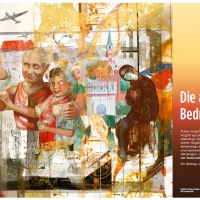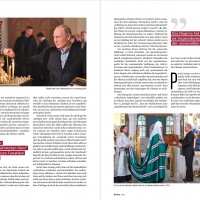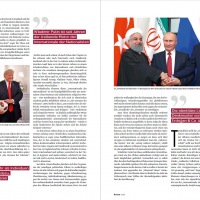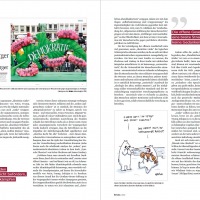The Authoritarian Threat
Identitarian politics as a danger to the open society
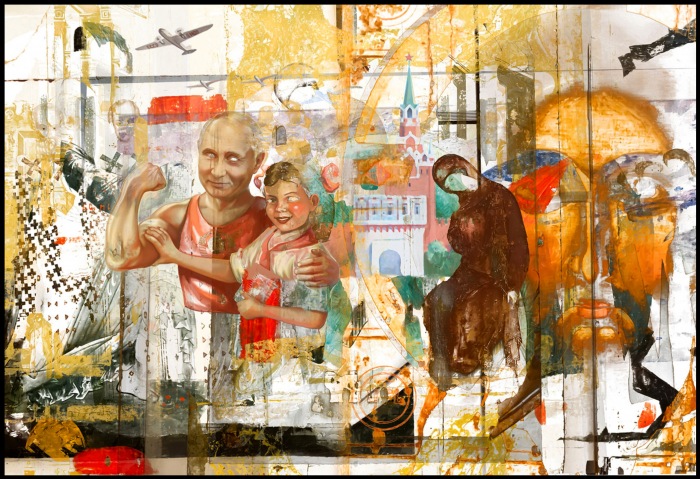
putin_artaward_2020.jpg
Painting by Oxana Sunnyday from the series "The world, the flesh, the devil, the soul" (DA! Art-Award 2020)
Putin's attack on Ukraine is also an attack on the open society. The Russian ruler, however, is by no means alone in his religious-nationalist propaganda. Identitarian thought patterns are on the rise worldwide – as Michael Schmidt-Salomon explains in an article for the "bruno." annual magazine, which will be published at the beginning of October and which can be read here in advance.
***
The most astonishing thing about the Russian invasion of Ukraine was the astonishment of Western politicians about this invasion. Apparently, right up until that point they had suppressed the fact that Vladimir Putin had deliberately laid the foundations for the escalation. The war was prepared long in advance - not only on an economic and military level, but also on a socio-cultural level: In the last 20 years, Russian citizens have been systematically trained in a "Russian-Orthodox identity", on the basis of which the "group-based misanthropy" that was unleashed in the war against Ukraine could develop.
It should have been clear to attentive observers that war was imminent by summer 2021 at the latest, when Putin published his extensive essay "On the Historical Unity of Russians and Ukrainians". But once again - as in the previous misjudgement of Islamism - Western politics did not take the "power of myth" seriously. They could not or did not want to understand why the Kremlin leader invoked the ideology of the "Holy Rus" and why he described the Orthodox faith as an unbreakable tie that binds Russians, Belarusians and Ukrainians together in a kind of "mythical community of destiny".
Certainly, Putin used and still uses the ideology of the "Holy Rus" to secure his mafia-like system of rule against democratic challenges. But this alone does not explain the Russian ruler's obsession. Even during his first term as president, Sergei Chemezov, Putin's former KGB chief in Dresden, had described his former subordinate as a "gift from God" who "will end the great suffering of the Russian people". Meanwhile, Vladimir Putin seems to believe this fairy tale himself. His statements and actions in recent years indicate that he now really does see himself as the "God-sent saviour of the fatherland", called to establish the "Holy Russian Empire" and turn Moscow into the "third and last Rome" that Orthodox fanatics have been dreaming of for centuries.
Putin resorts to the state doctrine of "Orthodoxy, Autocracy and Nationality" of the reactionary Tsar Nicholas I, and not without reason. Like Nicholas, Putin also relies on the unity of throne and altar. This is evident not only in the fact that he ordered more Orthodox churches to be built and renovated than any Russian ruler before him. Even more important is the ideological unity that has been celebrated for many years: For example, in 2006, Putin, together with Moscow Patriarch Cyril I, initiated the "Declaration on Human Rights and Human Dignity" of the WRPC ("World Russian People's Council"), which is similarly obscure as the (far better known) "Cairo Declaration of Human Rights in Islam": While for Islamists, human rights are only valid if they are in accordance with "Sharia", in Russia they are only accepted on the condition that they are in accordance with "Russian Orthodox values".
The Giordano Bruno Foundation fiercely criticized the "Russian Declaration" in its brochure "Human Rights" (2018), it was otherwise largely ignored in the West. This meant that Western observers not only overlooked the source of legitimacy for the systematic persecution of LGBTQ and alleged "ultra-feminists" in Russia. They also failed to see how the Putin regime has systematically established the Orthodox faith as a counter-ideology to the guiding culture of universal human rights and open society. To understand why Putin and Cyril in all seriousness used "gay parades in Kiev" to justify the war against Ukraine in February 2022, it is essential to know this background.
The timing of the "new Russian Tsar" and his "Orthodox court preacher" was perfect, by all means: On 23 February 2022, the "Day of the Defender of the Fatherland" (!), Cyril I preached that military service was a "manifestation of charity" and "an example of fidelity to the high moral ideals of truth and goodness". Only one day later, Putin demonstrated his love for "truth and goodness" when he invaded Ukraine.
***
Putin's dream of a Russian Orthodox superpower seems strangely anachronistic - and yet there is a system to his madness: with the help of old KGB connections, the Russian despot has not only succeeded in neutralizing the opposition in his own country, but also in destabilizing almost all democracies in the world. Putin's people were able to resort to tried and tested means from the Cold War: just as the KGB once supported left-wing terrorists like the RAF with covert operations, the Russian secret service now helped right-wing populists.
Putin's people supported Brexit in the UK and Trump's election in the US, they financed Marine Le Pen in France and Viktor Orbán in Hungary. Considerable amounts of money went into international pro-life, anti-gay, and anti-gender initiatives, as well as into internet troll factories that spread the most insane conspiracy theories online. In her thoroughly researched book "Putin's People", British journalist Catherine Belton proposed the possibility that part of the reason for the Russian blanket bombardment in Syria was to put pressure on European countries through the targeted generation of war refugees and to fuel the citizens' hatred of the political establishment.
As a matter of fact, Vladimir Putin has been the driving force of the "International of Nationalists" for years, which now reaches from Moscow to New Delhi to Washington. The outlines of this religious-nationalist international were apparent a decade ago (see the final declaration of the 2nd Critical Islam Conference of 2013). Three years later, in the book "Die Grenzen der Toleranz" (The Limits of Tolerance), I wrote: "Wherever you look, whether in Poland or Hungary, in Switzerland or Austria, in France, Russia or the USA: in almost every non-Muslim country in recent years an alliance has been formed between nationalists and the Christian right. The individual movements are so similar in their regressive identity politics that it almost doesn't matter whether their political figureheads are Donald Trump, Vladimir Putin, Viktor Orbán, Jaroslaw Kaczyński, Marine Le Pen, Christoph Blocher, or Frauke Petry."
The unifying element of this "International of Nationalists" is a blazingly dangerous mix of national chauvinism and reactionary religious values - a combination that is also very popular in Islamic countries. In "Die Grenzen der Toleranz" (2016), it says: "The Turkish president Recep Tayyip Erdoğan, whose politics combine nationalism and religion – in this case Turkishness and Islamic values – would in principle be a prime candidate for the right-wing populist 'International' and its formula of the 'Europe of the Fatherland' – if he did not adversely represent the wrong ethnicity and the wrong religion."
In recent years there has been a remarkable rise of Christian, Muslim, Hindu, even Buddhist nationalism, with different confessional emphases in different countries: Catholic in Poland, Hungary, and France; Protestant in the USA, England, and Switzerland; Orthodox in Russia, Greece, and Serbia; Sunni in Turkey, Egypt, and Saudi Arabia; Shia in Iran, Iraq, and Syria, Hindu in India, Buddhist in Myanmar.
With all their differences, the programmes of the respective political leaders are suspiciously similar: They are all directed against the cultural corollaries of modernity, against liberalisation, pluralization, individualization, secularization, against the rights of women and homosexuals, against the ideologically neutral state, against the principles of the open society. They are, to put it briefly, political sanctuaries for those who cannot keep up with the accelerated cycles of change in the globalized world and do everything they can to defend their ancestral cultural ghetto against the supposed "hostility" of the "foreign".
Last but not least, there are economic reasons why these identity-political models have become attractive worldwide: for example, neo-feudal structures have developed in many countries of the world, as a consequence the elites need to do practically nothing to maintain their status and the underprivileged can do practically nothing to improve their status. If people are no longer perceived as individuals in their society, however, they tend to define themselves through groups. If you combine the "glorious nation" with the "only true religion", you get an extremely effective drug that is ideally suited for revitalising an ailing egoconscious.
Vladimir Putin followed these anti-liberal developments around the globe closely and promoted them as much as possible. He himself was probably surprised by the resounding success of his strategy. In any case, the global developments played right into his hands. And so, as early as summer 2019, he triumphantly stated to the "Financial Times": "The liberal idea has become obsolete. It has come into conflict with the interests of the overwhelming majority of the population."
***
The "International of Nationalists" is a serious threat to the project of an open society. The only way to stop the proponents of the "closed society" would be a broad alliance of democrats - but this is currently not in sight. Unfortunately (as someone coming from this subculture, I must add), representatives of the "left" are largely responsible for this, and are currently performing a new edition of the absurd play "Judean People's Front against the People's Front of Judea" (Monty Python). Incapable of forging alliances with groups that are not 100 percent "in line", they waste their energies fighting other emancipatory actors over the smallest deviations in linguistic style, instead of confronting the real threat posed by the "International of Nationalists" to any emancipatory project.
Even worse: the so-called "identitarian left" has adopted fundamental thought patterns from Putin, Trump, Erdoğan & Co. Muchl like the religious-nationalist despots, "leftists" now place group identities at the centre of their arguments, undermine universal human rights as well as the rights of self-determination of the individual. Like representatives of the political right, they also condemn pluralism (believing themselves to be in possession of the "absolute truth"), scientific rationality (misunderstood as the ruling ideology of the "old white man") and any form of cultural intermixing (branded in leftist jargon as "cultural appropriation").
Certainly: there are honourable motives behind this strange strategy. The declared aim of the "woke left" is to make the voices of the "marginalized" heard, i.e. homosexuals, bisexuals, trans people, migrants, people of colour, the disabled, etc. But the postmodernist, identitarian orientation of the project harms those affected more than it helps them. Indeed, every emancipatory advance of the past was won by appealing to the empathy of the majority society and demanding "equal rights for all" - instead of undermining this human rights universalism and claiming that only the victims of oppression could comprehend the nature of oppression (see also the illuminating analysis of the "woke", postmodernist-identitarian left in the book "Cynical Theories" by Helen Pluckrose and James Lindsay).
"Problems can never be solved by the way of thinking that first created them", Albert Einstein once said – and was (as so often) spot on. As a matter of fact, left-wing identity politics in no way weakens right-wing identity politics, but rather strengthens the basic principles underlying the ruling models of Putin, Trump, Erdoğan & Co. This is why the Giordano Bruno Foundation has repeatedly launched campaigns in the past that deliberately weaken group identities instead of reinforcing them: in 2013, for example, we countered Islamists and "Christian saviours of the Occident" by emphasizing the autonomy of the individual over the collective with the slogan "Self-determination, not group pressure!". In 2018, for the 70th anniversary of the adoption of the Universal Declaration of Human Rights, we presented the slogan "Weltbürger statt Reichsbürger!" ("World citizens instead of Reich citizens!") to the public, countering the universalism of human rights against particular identity politics.
The defence of the open society would be much improved if "identitarian leftists" would recognize the logical contradictions in which they inevitably become entangled with their postmodernist argumentation. To mention just two points here, which Pluckrose and Lindsay support with numerous examples in their study: it is by no means "Eurocentrist" to stand up for the universality of human rights - rather, it would be Eurocentrist to claim that human rights are an exclusive achievement of the West, in which people from other continents and cultures have not participated. At the same time, it is of course not at all "racist" (an expression of the "ideology of the old white man") to insist on adherence to sound scientific standards and consideration of empirical research results - it would be racist, rather, to believe that people of other continents and cultures are incapable of conducting sound scientific research.
In addition, the "woke, left opposition" should understand that "plurality is not a weakness, but a strength" (as it says in a "mission statement" article on the gbs website). Only because we are different can we learn from each other and gradually "rise" to a more adequate view of the world through criticism and counter-criticism (motto of the Hans Albert Institute). The open society therefore needs a fair competition of ideas, i.e. a broad culture of debate - no "cancel culture" and certainly no "thought or language police". (On a side note: We take great pains not to conform to any language doctrine whatsoever (translator's note: referring to German gendered nouns), which is why you will find both gender forms, the gender asterisk as well as the generic masculine in German gbs publications, even within the untranslated version of this article. A little tolerance for ambiguity, we feel, is good for all sides – we take the liberty of keeping internal tally lists of who is most upset, by the way. Currently, the anti-genderists are in the lead...)
"Leftists" should learn from past mistakes before they go down in history as "useful idiots" of Putin, Trump, Erdogan & Co. They should certainly not promote the fascism they claim to fight. It is evident that the open society has no shortage of enemies – leftists who are in their right mind should not be among them, but should stand alongside other democrats against the authoritarian threat.
As of yet, Putin is wrong in his assessment that the "liberal idea is outdated" and "contradicts the will of the overwhelming majority of the population". While our model of coexistence needs improvement in many respects, the vast majority of people value the freedoms that an open society offers them. They trust that we can create better, freer, fairer conditions for all with the means of the democratic constitutional state. It is all of our responsibility to stop despots like Vladimir Putin who want to destroy this "liberal dream" (Philipp Blom).
***
 This article is part of the "bruno." annual magazine 2022, which will be published at the beginning of October in a print run of 10,000 copies. A layouted version of the German version of this article can already be downloaded as a pdf document via this link.
This article is part of the "bruno." annual magazine 2022, which will be published at the beginning of October in a print run of 10,000 copies. A layouted version of the German version of this article can already be downloaded as a pdf document via this link.

